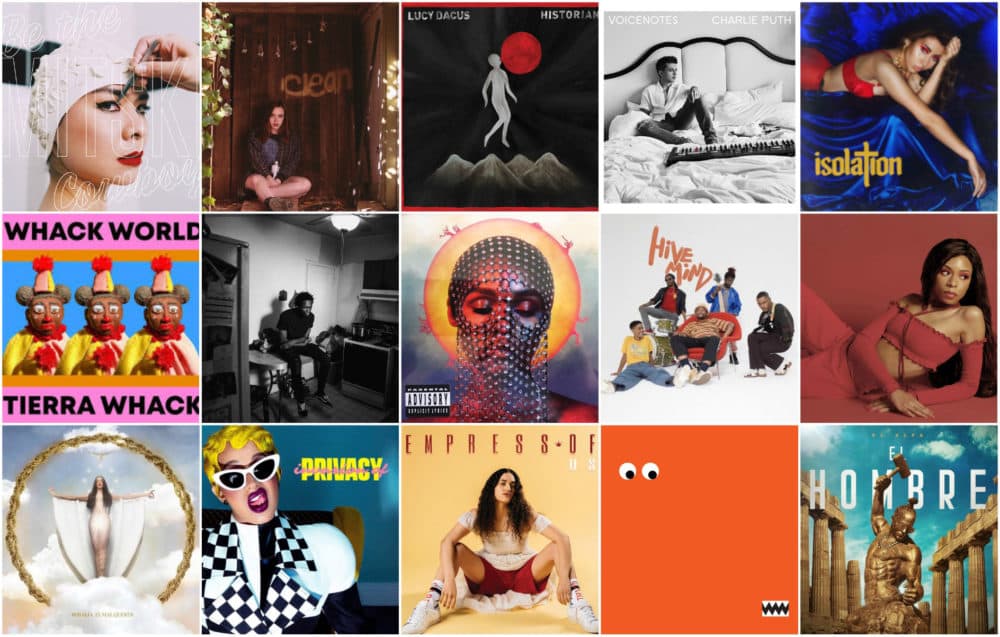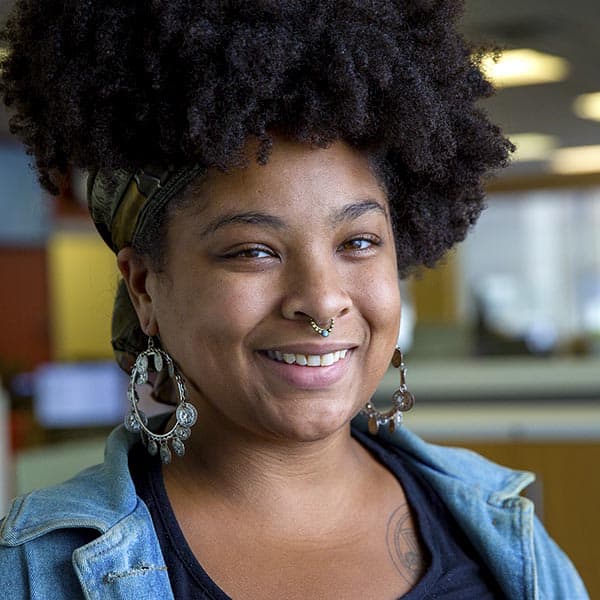Advertisement
The Year In Arts & Culture
The 15 Best Albums Of The Year

Music critics Amelia Mason, Arielle Gray and Eduardo Cepeda reflect on the year on the popular music landscape.
Amelia Mason:
Earlier this year, the singer-songwriter Liz Phair tapped a Nashville indie-rock outfit called Soccer Mommy to support her on tour. Phair was promoting the release of “Girly-Sound to Guyville: The 25th Anniversary Box Set,” which contained a remastered version of her seminal album “Exile in Guyville,” and Soccer Mommy was riding the wave of the success of its sophomore release, “Clean.” It was a natural pairing, despite the 30-year age difference between Phair and Soccer Mommy’s young frontwoman, Sophie Allison. From its jangly guitars to Allison’s acidic lyricism, “Clean” was cut from the same cloth laid out by “Exile in Guyville” all those years ago.
The same might be said of many other artists. Mitski, Lucy Dacus, Waxahatchee, Phoebe Bridgers, Frankie Cosmos — the last few years have been especially fertile ones for women in rock. Like Phair, these musicians have been subjected to many a feminist reading; and like Phair, their fidelity has always been to the craft of songwriting, which they attack with wit, subtlety and skill. The fact that excellent songs by women are necessarily cast as feminist statements speaks less to their creators’ politics as to the tyranny of male genius in popular music. (Another great women-led project from this year, boygenius, alludes cheekily to this problem in its title.) It’s been said before, but it bears repeating: A woman who strums a guitar and sings is seen as engaging in a small, and fundamentally narcissistic, project, while a man who does the same may be the voice of a generation. And so Soccer Mommy’s wry, raw, expertly-crafted songs feel radical, even 25 years after “Exile in Guyville” ought to have put the issue to bed.
In this way, our era’s indie-rock women could be said to be taking up Phair’s mantle, though they’re far from the first to do so. Whatever the case, it was their work that I connected with most in 2018. Mistki, Lucy Dacus and Soccer Mommy all made my list. The other two, Charlie Puth and Kali Uchis, didn’t emerge from the indie-rock or singer-songwriter traditions, but their music exhibits many of the same priorities. Taken together, the best lines from these five albums could practically write a book. Never underestimate the power of a well-turned phrase.
Mitski, 'Be the Cowboy'
Mitski’s 2014 album “Bury Me At Makeout Creek” vaunted her to indie-rock stardom, but it was this year’s “Be the Cowboy” that prompted NPR to declare her “the 21st century’s poet laureate of young adulthood.” In fact, “Be the Cowboy” is good enough to place Mitski among the poet laureates of popular music, period, in those rarefied echelons usually reserved for white men.
Mitski writes with masterful precision, a conjurer of captivating melodies and lacerating poetry. Consider these lines, from the song "Lonesome Love": "Nobody butters me up like you/ And nobody f---- me like me." Never have longing’s strange contradictions been so exquisitely evoked. Mitski may be associated with indie rock, but she has always chosen her arrangements to suit her needs, and “Be the Cowboy” sees her moving confidently into new sonic territory. Even as she trims the songs down in length — none surpass the three-minute mark — she expands them to almost operatic proportions. “Be the Cowboy” extracts pathos from electronic quirk, enlists disco’s ebullient rhythms in grand melodrama, wields shimmering synths like knives. Call it an anti-concept album — each mercilessly brief song is a universe unto itself, but gunning for greatness just the same.
Soccer Mommy, 'Clean'
2018 was a breakthrough year for Sophie Allison, aka Soccer Mommy, whose sophomore studio album, “Clean,” launched the musician into the heady realm of critical adoration. Allison’s melodies twist themselves around your brain like brambles, tensile and stinging. She employs sound sparingly, preferring the prick of dissonance to the scream of distortion. But her lyrics are where she truly distinguishes herself. To describe the songs on “Clean” as “sad” would be to erase sadness’s many shades, and Allison’s ability to express them — how desire can feel violent, and infatuation makes you hate yourself, and spite is the fastest way to get over someone. Dark stuff, I know, but Allison delivers it with sardonic relatability and a rare gift for metaphor. “I wanna make a knot and drag you like a kite,” she sings on “Skin,” wishing her lover felt the same excruciating yearning for her as she does for him. Sometimes the ugliest emotions produce the prettiest songs.
Lucy Dacus, 'Historian'
I tend think of Lucy Dacus as a warmer, more effusive sister to Soccer Mommy. Dacus writes with biting wit, but her songs soar where the other’s simmer. “Historian” takes an expansive approach to the trials of young adulthood. A song about a withering relationship becomes a meditation on dependence, while a rumination on losing one’s religious faith asks more questions than it answers. Dacus possesses one of the more sublime singing voices in indie rock; it’s pure and sweet and weighted with hard-won wisdom. “Everybody else, everybody else looks like they’ve figured it out,” she sings, knowing full well that they haven’t. “Historian” makes the case that it’s worth trying anyway.
Charlie Puth, 'Voicenotes'
In the year 2015, you’d have been hard-pressed to find a song I despised more than “See You Again” by Wiz Khalifa, featuring Charlie Puth. A maudlin tribute to the actor Paul Walker, who died in a car accident in 2013, “See You Again” spent 12 weeks at the top of the Billboard Hot 100 and lodged itself permanently in the song-hatred matrix of my brain, next to “Wild Mountain Thyme” and Aerosmith’s “I Don’t Want To Miss A Thing.” The most distinctive part of “See You Again” was its chorus, which Puth crooned mawkishly over a sappy piano riff, so I mostly blamed him for the song’s awfulness. (Khalifa had the dubious advantage of being completely unmemorable.)
Still, “See You Again” could not totally mask Puth’s talent, which he puts to startlingly good use on his second studio album, “Voicenotes.” Nine of the 13 songs on “Voicenotes” are bonafide bops, anchored in muscular bass lines and Puth’s limber falsetto. “Voicenotes” doesn’t so much break new ground as mine the old, reconstituting the infectious treacle of ‘80s pop and R&B into a concoction that’s as sharp as it is sweet. Puth prefers to cast himself as the victim in relationships, and his kiss-offs are second-to-none. “I lie for you baby/ Die for you baby/ Cry for you baby/ But tell me what you’ve done for me,” he sings on “Done For Me,” deftly subverting an age-old trope. “BOY,” which laments the singer’s mistreatment at the hands of an older woman, delivers its grievances with a wink: “You won’t wake up beside me/ ‘Cause I was born in the ‘90s.” At times, Puth writes with disarming specificity. “Hands on your body/ Like there’s no one at the party/ Just you and me/ And these empty cups,” he sings on “Empty Cups,” shrewdly recognizing the resonance of even the humblest image.
Kali Uchis, 'Isolation'
Kali Uchis’ “Isolation” is proof that the recent R&B renaissance still has plenty to give. Uchis tapped a number of different producers for the project, including Gorillaz and Thundercat, and her taste proves both discriminating and varied. “Isolation” slips through moods like an eel through water, melting from the humid haze of “Miami” to the girl-group sweetness of “Flight 22” to the murmuring reggaeton of “Nuestra Planeta (ft. Reykon).” The guest star turns are no less satisfying. Steve Lacy’s appearance on “Just A Stranger” results in the most delectable hook of the year, or maybe that honor should go to “Your Teeth In My Neck”; the point is, the songs on “Isolation” are utterly seductive. Uchis shifts from dreamy to yearning to lovelorn, but defiance suits her best. “I’ve been working so hard just to give you more,” she sings on “Your Teeth In My Neck,” squirming under the boot of her capitalist overlord. “It’s your teeth in my neck.” That may be the case, but Uchis isn’t afraid to show hers, either.
Arielle Gray:
This year, we’ve seen an almost unprecedented release of new music in both hip-hop and R&B. Choosing just five albums is a difficult task, considering the wide range of sounds and concepts that have dropped in 2018. Intricate musical production is one of the things that separates the artists on this list from the barrage of EPs and LPs I’ve listened to in the past 12 months. Most of them have heavily incorporated visuals into their work, intertwining their music with video production that greatly extend the reach of their sound and musical messages. Considering that music listeners are progressively streaming more and more new music on video platforms such as YouTube, combining audio and visuals seems to be the next wave in transforming the musical experience. Individuality and innovation are imperative to standing out in a culture with an increasingly dwindling attention span and all of the artists on this list have achieved an impressive balance of both.
Tierra Whack, 'Whack World'
Although “Whack World” stands at a slight 15 minutes long, it deserves this spot based off of creativity alone. Philadelphia-born Tierra Whack has been publicly rapping since 2011 but didn’t break the ceiling in the music industry until she dropped “Mumbo Jumbo” last year, to critical acclaim. “Whack World” is a colorful, mind-bending audio visual roller coaster through Whack’s mind as an artist, varying greatly in genre, delivery and musical style. Each minute-long song is accompanied by visuals specific to the track’s lyrics, turning words into visually sensory experiences. Whack moves seamlessly from singing to mumble rapping to saccharine sweet bars but never loses her voice or unique delivery style.
Saba, 'CARE FOR ME'
Saba’s lyricism paired with the lush production on "CARE FOR ME" easily puts it on the list of one of the most underrated hip-hop albums of the year. The Chicago native has been lauded by the likes of Chance the Rapper and Mick Jenkins but has yet to gain the recognition his musicianship deserves. "CARE FOR ME" is an emotionally heavy and explicitly personal project, written in the aftermath of the murder of Saba’s cousin, Walter Long. “I tell Death to keep a distance/ I think he obsessed with me,” Saba says on the track “Life.” Death is woven into almost every song but the differences in style of each track on the album provide an aural dissonance that (quite literally) keeps the theme of death at bay. Saba manages to transform his thoughts of suicide, his depression and his triumphs over both into musical soundscapes that take you on a sonic journey through his intricate artistic process.
Janelle Monáe, 'Dirty Computer'
QTPOC have spent years ruminating over Janelle Monáe’s ambiguously unconfirmed sexuality and this year, Monáe finally made all of our queer hopes and desires come true with her audio visual project “Dirty Computer.” Monae, who identifies as pansexual, brings her sexuality to the forefront in this album, boldly claiming her queerness through a series of technology metaphors that are intertwined from song to song. “I am not America’s nightmare/ I am the American dream,” Monáe asserts in the '80s synth pop track “Crazy, Classic, Life.” Rebellion against white supremacy and the heteronormative patriarchy lies at the heart of “Dirty Computer” and Monáe does it so effortlessly by blending sound and genres, epitomizing the fact that everything is fluid, including identity and sexuality.
The Internet, 'Hive Mind'
“Hive Mind” is The Internet’s follow up to their critically acclaimed, Grammy-nominated “Ego Death” that was released in 2015. In their three year hiatus, nearly all of the members have dropped solo projects that highlight the growth of each of their individual musical aptitudes. “Hive Mind” is a coming together again, showcasing a more mature sound that combines digitally processed musical elements, like Matt Martians’ expert manipulation of synths, with live musical elements like Patrick Paige’s bouncy bass lines that add depth and weight to Syd Bennett’s floaty vocals. Overall, “Hive Mind” is sexy and slinky, a throwback to '90s R&B while simultaneously representing how modern sounds and technique can transform and change the R&B genre.
Ravyn Lenae, 'Crush'
Ravyn Lenae is one of those artists whose been the scene for years but is only just getting the acknowledgement her sound warrants. Her honey-dipped voice, breathy and delicate as lace, transcends multiple vocal ranges and her original, clever songwriting make her an artist to watch out for. “Crush” is her third collection of work and the only problem with it is that’s it’s too short. Produced entirely by The Internet’s Steve Lacy, “Crush” is a red-tinged and blunt exploration into the intertwining of love and heartbreak, themes Lenae has explored on her previous projects. But “Crush” is different, layered with contrasting gritty synths, heavy bass and drum kicks that prop up Lenae’s sensual vocals and intricate harmonies. The whole project could be the soundtrack to a '70s summer night, with the most modern sounds coming from “Computer Luv.” Lenae’s dedication to her songwriting and her growth from her debut EP that dropped a short three years ago exemplify the extent of her musical transformation, one that doesn’t seem to be slowing down any time soon.
Eduardo Cepeda:
2018 saw Spanish-language music break past the preconceived molds of "Latin crossover," and finally begin to take a more normalized space in American pop-culture. From mega successes like Cardi B and J Balvin, to unlikely flamenco fusions by Rosalía that once would have fallen under the "world music" category, Latinx culture and Spanish-language pop has redefined the concept of pop music in American markets. Had Bad Bunny released his multi-genre debut album "X 100PRE" a few days earlier, it would have topped my list.
Rosalía, 'El Mal Querer'
Twenty-five-year-old Catalan singer Rosalía’s second album further builds on the flamenco foundation her first album 2017’s "Los Angeles" laid out. Co-produced with El Guincho, the album layers electronic soundscapes over traditional palmas (Flamenco clapping) and melismatic vocals that come together with a concise but well-thought out pop foundation — delivering a harrowing yet strangely approachable redefinition of pop music. An album this game-changing comes once every decade, if we’re lucky.
Cardi B, 'Invasion of Privacy'
Many wanted to see Cardi B’s debut full-length album flop. The thought of a Bronx-raised, Spanglish-speaking, exotic dancer-turned reality star making a meaningful impact on pop culture frightened the dark patriarchal reaches of the internet. But Cardi not only blasted past expectations, she delivered a well-rounded pop album (yes, hip-hop is pop now, despite what latently racist gatekeepers may argue) that covered everything from the hardest-edged trap sounds, to Latin heaters and even a bossa nova-based revenge anthem. Cardi’s reign is just beginning, and she wants you to know: Be careful with her.
Empress Of, 'Us'
Lorely Rodriguez, known artistically as Empress Of, recently relocated to her native Los Angeles, and the vibe on her second full-length reflects her move home. Sunshine and pop-adjacent hooks adorn this electronic-tinged jaunt. With songs both in English and Spanish, “Us” reflects Rodriguez’s daily life as a thriving Latinx in sunny LA.
J Balvin, 'Vibras'
For many people, J Balvin’s brand of radio-ready Medellín-produced reggaeton signals a blanqueamiento (whitewashing) for the genre, but for others, it marks a turning point in what was seen as a silent period for perreo. Whichever side you may land on, there’s no denying that Vibras is a pivotal album that not only shines a spotlight on reggaeton, it does so while reminding the world that the genre’s not ready to be relegated to gimmicky collaborations with insufferable Canadian pop stars.
El Alfa, 'El Hombre'
2018 was the year musica urbana broke. Reggaeton and Latin trap dominated Latin American charts and playlist, and made unbelievable inroads into mainstream American charts — mostly avoiding the dreaded campy “crossover” forays into English singing or trite collaborations to appeal to white audiences (the aforementioned "Despacito" being a major, painful exception). But one of the lesser-talked-about genres under the urbano umbrella, Dominican dembow (a descendant of the same dembow riddim that reggaeton was built on, though with completely different execution), also had an incredible year. And El Alfa’s "El Hombre" helped lead the dembow charge. Though not strictly a dembow album through and through (there’s hip-hop, Latin trap and even a reggaeton collaboration with Cardi B), El Alfa reminds audiences why he’s the voice of dembow, and leaves us wanting more. We’ll certainly be hearing more from him — and other dembow artists — in 2019.

















